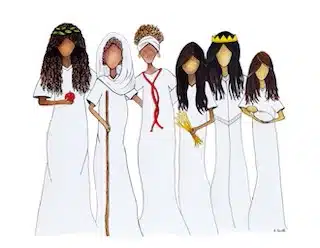Influential Women in Early Church History: Part 1 – Perpetua

Article 1 of 5

By Rev. Dr. Jackie Roese
Founder and President of The Marcella Project
www.themarcellaproject.com
This article is part of the series Pursuing Partnership: Men and Women in Ministry.
Perpetua: A Woman of Faith and Courage Who Defied Cultural Expectations
Perpetua was a young, well-educated noblewoman of Carthage in the 3rd century. Her story is recorded in “The Passion of Saints Perpetua and Felicity,” one of the oldest and most notable stories about a woman in early Christian writings. We do not have a lot of writings preserved from the pre-Constantine era, and even fewer writings from or about women. But this isn’t evidence that women weren’t influential. Women like Perpetua shifted the church’s thinking about suffering and the virtue of martyrdom. This influential woman teaches us to endure under duress and that sometimes, following Christ means defying cultural and societal expectations. (Luke 14:26)
As a woman of nobility, she was required to sacrifice to the imperial cult that worshiped the emperor. Her refusal meant death (martyrdom) in the arena. Repeatedly, her father pleaded with her to recant. In Greco-Roman culture, family was everything. The Father ruled, meaning the dad (or the eldest male) had absolute authority. Honor and status were partly gained by how the father managed his family. Every decision made was to benefit the family. A daughter brought honor to her family by being loyal, dutiful, and industrious. But this new convert, at the young age of twenty-two, would not obey her Father at the expense of denying her Savior.
Often, when we resist the expectations of others, we are labeled as rebellious. But Perpetua shows us that the root cause isn’t always rebellion. Sometimes, it’s simply obedience to the Father. We can learn the appropriate posture of resistance by listening to her words of humility and love towards her father. She said,
“When my father, in his affection for me, was trying to turn me from my purpose by arguments and thus weaken my faith, I said to him, ‘Do you see this vessel—water pot or whatever it may be? Can it be called by any other name than what it is?’ ‘No,’ he replied. ‘So also, I cannot call myself by any other name than what I am—a Christian.'”
In many faith communities, we learn of specific characteristics attributed to a particular gender: women are gentle and receptive, and men are decisive and assertive. Similarly, in Greco-Roman culture, virtues were gendered. Women were passive, to endure and be industrious, whereas masculine virtue was active and self-controlled. Masculinity was exhibited through bravery and courage. Seneca taught that if a man were captured, at all costs, he shouldn’t allow himself to be tortured. Rather, he should choose virtue over vice by committing suicide instead of being humiliated. A woman taking on masculine virtues would shame her family.
However, Perpetua’s leadership and authority over men in the arena placed her in masculine territory. In the arena, she took on the beasts with courage and bravery. Acting like a man, she allowed men to rub oil on her naked body, and she drew to her neck the knife wielded by a less-than-courageous soldier. In this taking on male virtues in her situation, she also attended to her “feminine values,” as demonstrated in her endurance and by keeping her dress and hair neatly in place while at the same time being challenged by beasts and soldiers. I take wisdom from her example; we can challenge the cultural norms while continuing to live within the structures of our day. In many ways, Jesus did the same.
Stories like Perpetua were venerated in the early Church but were lost or untold over time. But we need her story because her courage and bravery encourage us to walk faithfully through the trials of life. She reminds us that this isn’t our only life; the resurrected life is to come. Her words and actions transgressed cultural expectations, dishonored her family, and threatened the Roman-Greco domestic system. It is for this reason that the early Christians were called Apostolic homewreckers. Her life informs us that sometimes we are forced to choose – obedience to Christ at the cost of family and friends. (Galatians 1:10)
This article is submitted by Wendy Wilson of Missio Nexus and of Women’s Development Track. Women’s Development Track is a Missio Nexus member. Member organizations can provide content to the Missio Nexus website. See how by clicking here.





Responses